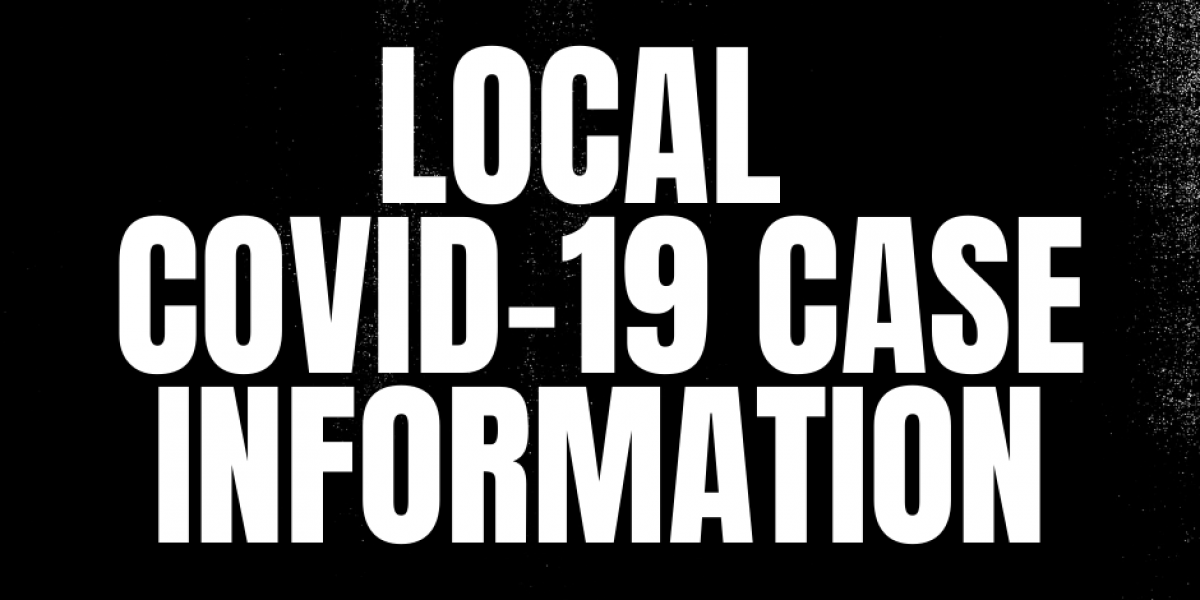| Date | New cases | Active cases | Total cases | Exposure category of the new case(s) | Resolved cases | In community | In hospital | Total deaths | Vaccines Administered |
| Dec. 30, 2021 | 1 | 6 | 93 | 84 | 6 | 0 | 3 | ||
| Dec. 28, 2021 | 3 | 5 | 92 | 84 | 5 | 0 | 3 | ||
| Dec. 27, 2021 | 2 | 2 | 89 | 84 | 2 | 0 | 3 | ||
| Dec. 24, 2021 | 1 | 1 | 87 | 83 | 1 | 0 | 3 | ||
| Dec. 7, 2021 | 1 | 0 | 86 | 82 | 1 | 0 | 3 | 81% with 1 dose (12+) 75% with both doses (12+) | |
| Nov. 30, 2021 | 0 | 0 | 85 | 82 | 0 | 0 | 3 | 81% with at least 1 dose (12+) 75% with both doses (12+) | |
| Sept. 10, 2021 | 0 | 0 | 85 | 82 | 0 | 0 | 3 | 2969 first doses 2723 second doses | |
| July 6, 2021 | 0 | 0 | 85 | 82 | 0 | 0 | 3 | 2838 first doses 1807 second doses | |
| June 29, 2021 | 0 | 1 | 85 | 81 | 1 | 0 | 3 | 2838 first doses 1807 second doses | |
| June 24, 2021 | 1 | 2 | 85 | Close contact | 80 | 2 | 0 | 3 | 2814 first doses 1327 second doses |
| June 23, 2021 | 0 | 1 | 84 | 80 | 1 | 0 | 3 | 2814 first doses 1327 second doses | |
| June 21, 2021 | 1 | 2 | 84 | Close contact | 79 | 2 | 0 | 3 | 2814 first doses 1327 second doses |
| June 10, 2021 | 0 | 2 | 83 | 78 | 1 | 1* | 3 | 2647 first doses 990 second doses | |
| June 9, 2021 | 0 | 3 | 83 | 77 | 2 | 1* | 3 | 2647 first doses 990 second doses | |
| June 7, 2021 | 0 | 5 | 83 | 75 | 5 | 0 | 3 | 2557 first doses 979 second doses | |
| June 3, 2021 | 1 | 7 | 83 | Currently unknown | 73 | 6 | 1* | 3 | 2396 first doses 771 second doses |
| June 2, 2021 | 1 | 6 | 82 | Close contact | 73 | 5 | 1* | 3 | 2396 first doses 771 second doses |
| May 31, 2021 | 4 | 6 | 81 | 2 close contacts, 2 unknown | 72 | 5 | 1* | 3 | 2396 first doses 771 second doses |
| May 27, 2021 | 1 | 2 | 77 | Currently unknown | 72 | 2 | 0 | 3 | 2396 first doses 771 second doses |
| May 26, 2021 | 1 | 1 | 76 | Close contact | 72 | 1 | 0 | 3 | 2396 first doses 771 second doses |
| May 25, 2021 | 0 | 0 | 75 | 72 | 0 | 0 | 3 | 2396 first doses 771 second doses | |
| May 19, 2021 | 1 | 2 | 75 | Close contact | 70 | 2 | 0 | 3 | 1686 first doses 94 second doses |
| May 17, 2021 | 1 | 1 | 74 | Travel outside of the Thunder Bay district | 70 | 1 | 0 | 3 | 1686 first doses 94 second doses |
| May 7, 2021 | 0 | 0 | 73 | 70 | 0 | 0 | 3 | 1215 first doses 63 second doses | |
| Apr. 23, 2021 | 1 | 1 | 73 | Pending | 68 | 1 | 0 | 3 | 901 first doses 63 second doses |
| Apr. 19, 2021 | 0 | 1 | 72 | 68 | 1 | 0 | 3 | 901 first doses 63 second doses | |
| Apr. 15, 2021 | 1 | 3 | 72 | Close contact | 66 | 3 | 0 | 3 | 901 first doses 63 second doses |
| Apr. 13, 2021 | 0 | 3 | 71 | 65 | 3 | 0 | 3 | 709 first doses 63 second doses | |
| Apr. 12, 2021 | 1 | 4 | 71 | Close contact | 64 | 4 | 0 | 3 | 709 first doses 63 second doses |
| Apr. 9, 2021 | 0 | 4 | 70 | 63 | 4 | 0 | 3 | 709 first doses 63 second doses | |
| Apr. 7, 2021 | 3 | 7 | 70 | 1 close contact 2 pending | 60 | 7 | 0 | 3 | 556 first doses 50 second doses |
| Apr. 6, 2021 | 0 | 10 | 67 | 54 | 4 | 6 | 3 | 556 first doses 50 second doses | |
| Mar. 31, 2021 | 6 | 17 | 67 | NOSH facility-wide outbreak Community | 48 | 8 | 9 | 2 | 456 |
| Mar. 29, 2021 | 2 | 13 | 61 | NOSH facility-wide outbreak | 47 | 3 | 10 | 1 | 456 |
| Mar. 28, 2021 | 1 | 11 | 59 | NOSH facility-wide outbreak | 47 | 8 | 1 | 456 | |
| Mar. 26, 2021 | 3 | 11 | 58 | NOSH facility-wide outbreak | 46 | 9 | 1 | 456 | |
| Mar. 24, 2021 | 3 | 8 | 55 | NOSH Chronic Care outbreak Community | 46 | 6* | 1 | 306 | |
| Mar. 23, 2021 | 2 | 9 | 52 | NOSH Chronic Care outbreak | 42 | 5* | 1 | 306 | |
| Mar. 22, 2021 | 0 | 7 | 50 | 42 | 3* | 1 | 306 | ||
| Mar. 19, 2021 | 1 | 8 | 50 | NOSH Chronic Care outbreak | 42 | 4* | 306 | ||
| Mar. 18, 2021 | 1 | 7 | 49 | NOSH Chronic Care outbreak | 42 | 4* | 306 | ||
| Mar. 17, 2021 | 1 | 6 | 48 | NOSH Chronic Care outbreak | 42 | 3 | 306 | ||
| Mar. 16, 2021 | 1 | 5 | 47 | NOSH Chronic Care outbreak | 42 | 2 | 306 | ||
| Mar. 13, 2021 | 1 | 4 | 46 | NOSH Chronic Care outbreak | 42 | 2 | 306 | ||
| Mar. 12, 2021 | 3 | 3 | 45 | No known exposure | 42 | 0 | 306 | ||
| Mar. 11, 2021 | 0 | 0 | 42 | 42 | 0 | 306 | |||
| Feb. 26, 2021 | 0 | 0 | 42 | 42 | 0 | ||||
| Feb. 22, 2021 | 0 | 0 | 42 | 42 | 0 | ||||
| Feb. 13, 2021 | 0 | 0 | 42 | 42 | 0 | ||||
| Feb. 3, 2021 | 0 | 0 | 42 | 42 | 0 | ||||
| Jan. 26, 2021 | 1 | ≤5** | 42 | Valard West-Tie project outbreak | 17 | 0 | |||
| Jan. 22, 2021 | 3 | ≤5** | 41 | Valard West-Tie project outbreak | 17 | 0 | |||
| Jan. 21, 2021 | 1 | ≤5** | 38 | Valard West-Tie project outbreak | 17 | 0 | |||
| Jan. 20, 2021 | 20 | 0 | 37 | Valard West-Tie project outbreak | 17 | 0 | |||
| Dec. 31, 2020 | 0 | 0 | 17 | 17 | 0 | ||||
| Dec. 17, 2020 | 0 | 6 | 17 | 11 | 0 | ||||
| Dec. 15, 2020 | 1 | 9 | 17 | Close contact | 8 | 0 | |||
| Dec. 11, 2020 | 1 | 12 | 16 | Close contact | 4 | 0 | |||
| Dec. 10, 2020 | 2 | 15 | 15 | Close contacts | 0 | 0 | |||
| Dec. 9, 2020 | 3 | 13 | 13 | Close contacts | 0 | 0 | |||
| Dec. 7, 2020 | 3 | 10 | 10 | Close contacts | 0 | 0 | |||
| Dec. 5, 2020 | 2 | 7 | 7 | Pending, close contact | 0 | 0 | |||
| Dec. 2, 2020 | 2 | 5 | 5 | Close contacts | 0 | 0 | |||
| Nov. 30, 2020 | 2 | 3 | 3 | Pending, travel | 0 | 0 | |||
| Nov. 24, 2020 | 1 | 1 | 1 | No known exposure | 0 | 0 |
**Numbers include residents of Marathon, Biigtigong Nishnaabeg and Netmizaaggamig Nishnaabeg
Why some fully vaccinated people are testing positive for COVID-19
December 2, 2021 – Now that about 86% of the 12+ population in the Thunder Bay District is fully vaccinated, you may be wondering why we’re seeing a rise in COVID-19 cases across our district, and more specifically, why some of these cases are in fully vaccinated people.
Even though some fully vaccinated individuals are testing positive for COVID-19, it doesn’t mean that the vaccines are not working. In fact, research is consistently showing that the Moderna and Pfizer COVID-19 vaccines are up to 97% effective against severe disease, hospitalization and death, and up to 89% effective against infection (depending on the variant).
Being fully vaccinated does not mean that you will never catch COVID-19, but it greatly reduces your risk of becoming infected compared to if you’re unvaccinated. Vaccinated people are also contagious for less time and they spread less of the virus to others. So yes, vaccinated people can still catch COVID and spread it to others, but it’s much less probable. This also explains why vaccinated people are not ‘just as likely’ to spread COVID as unvaccinated people. Simply put, you can’t spread it if you don’t have it.
The COVID-19 vaccines add a very effective level of protection from COVID-19. Combining vaccination with other public health measures, including staying home when sick and getting tested if you have COVID-19 symptoms, will help keep you COVID-safe as you spend more time indoors and may choose to participate in activities that have a higher risk of transmission.
Variants of concern in Marathon
May 25, 2021 – Both newly resolved cases of COVID-19 in Marathon were confirmed as being U.K. variants of concern. So far, evidence suggests that variants of concern spread more easily than the original strain, meaning they are more contagious. They may also cause more severe illness. While the variants of concern spread more easily, they spread in the same way as original COVID-19. This means the same types of preventive strategies will be effective. However, these variants can more easily take advantage of any relaxation of those preventive measures. This reinforces the importance of staying vigilant as more individuals in our communities and across the province become fully vaccinated.
There is also some concern that COVID-19 vaccines are not as effective at protecting us from variant strains of COVID-19. But as more research is being done, experts are reporting that vaccines still appear to provide excellent protection against COVID-19 for those who are fully vaccinated. For example, the Pfizer vaccine seems to be 89% effective at protecting individuals from any infection from the U.K. variant and 94% to 97% effective at protecting against severe disease, hospitalization and death from any variant of concern.
Continuing to follow public health measures and seeking COVID-19 vaccination are great ways to protect yourself and your loved ones from COVID-19 and variants of concern.
Outbreak declared over at the Wilson Memorial General Hospital
The MFHT and NOSH are also pleased to announce that, as of 7:00pm April 13th, the facility-wide outbreak at the Wilson Memorial General Hospital is officially declared over.
NOSH is extremely grateful to the physicians, healthcare workers and staff who worked tirelessly to manage the outbreak and to continue to provide quality, compassionate care to our patients. We would also like to thank our patients and their caregivers for their support, trust and patience as we navigated through the outbreak.
To everyone in the community who has sent us well wishes and messages of support over the last few weeks, thank you! Your support helped the NOSH staff and patients stay positive throughout these challenging times.
Last but not least, we would like to recognize the Thunder Bay District Health Unit for their guidance and assistance over the last few weeks.
“While today we celebrate the incredible efforts of our staff and physicians, support from our community and the resiliency of our patients, we should also pause and remember the loss of three of our community members to COVID”, says Adam Brown, NOSH CEO.
COVID-19 related deaths in Marathon
It is with great sadness that the Marathon Family Health Team (MFHT) and the North or Superior Healthcare Group (NOSH) are reporting a third COVID-19-related death in Marathon. Out of respect in this difficult time, no further details will be provided.
The MFHT and NOSH offers our deepest condolences to the family and friends of both individuals. “This is a very sad day for all of us at NOSH and especially for the loved ones of the individual who passed away. Our thoughts go out to everyone affected by this loss”, says Adam Brown, NOSH CEO. “Our hospital continues to take strong measures to protect our patients, our healthcare workers and our communities. Please continue to be safe and kind to each other as we get through this”.
We recognize that this news is difficult for all to hear. The loss of a community member is hard, especially under these circumstances. The MFHT and NOSH encourage our patients and community members to check-in, reach out and support one another, while following public health advice, as they live through this loss.
This unfortunately highlights the reality of COVID-19 and the need for everyone to take this virus seriously. Recognizing that many are at higher risk of serious illness or death from the virus, we urge everyone to continue doing everything they can to prevent its spread, including staying home as much as possible, limiting close contact with others, avoiding travel outside of our communities and following other safety measures.
We are in this together.
Contact tracing and self-isolation
All patients who have tested positive for the virus have been contacted by the Thunder Bay District Health Unit (TBDHU) and are self-isolating at home to prevent further spread of the virus.
The TBDHU is completing very thorough contact tracing and will contact those who are considered high risk contacts of the individuals who have tested positive for COVID-19. At this time, anyone who is not specifically contacted by public health, would be considered at low risk. If you are deemed a high risk contact and require testing, the public health liaison that you speak with will help you to figure out what day is the best day for you to be tested to get the most accurate results.
To help with the contact tracing process, consider downloading the COVID Alert app.
For more information on self-isolation, please click here.
Preventing further spread of COVID-19 in our communities
Everyone is encouraged to continue to follow public health to help keep our family, friends and neighbours safe. Please click here for more information on how to protect yourself and others from COVID-19.
Contacting the MFHT
Please email appointments@mfht.org to request an appointment. Emailing the clinic is currently the most effective way of reaching us. If you don’t have access to a computer or have an email address, you can contact us by calling 807-229-3243.
Additional COVID-19 information
All new case information can be found on the TBDHU’s website and Facebook page. If you have any questions related to COVID-19, please contact the TBDHU for more information. Public health professionals are here to guide you and to provide you with individualized advice during these uncertain times.



